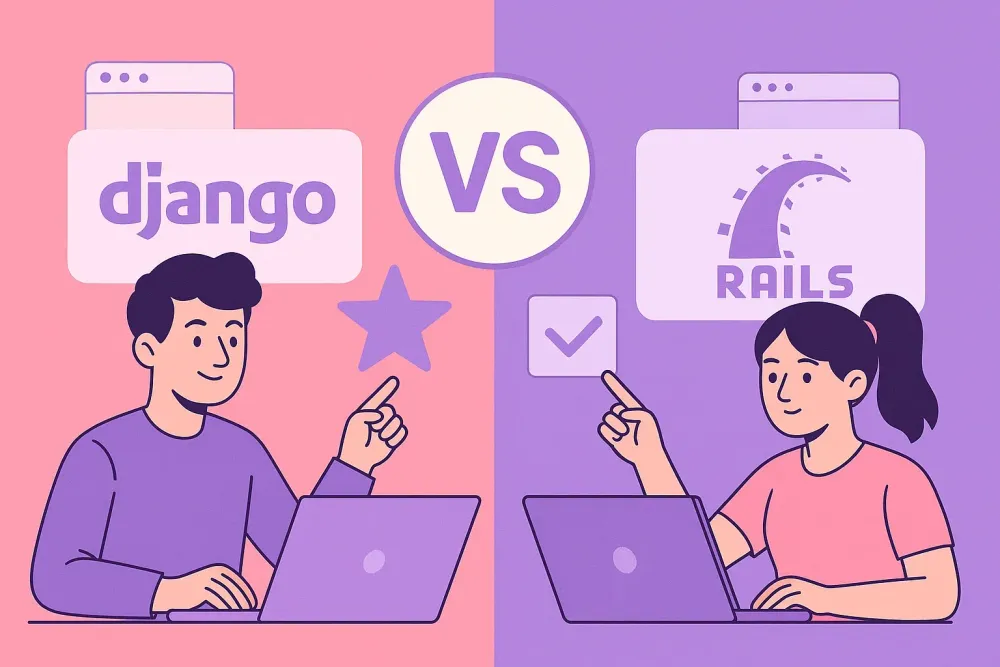Home
Services
Products
Projects
Who We Are
Blogs
Contact Us

Django vs. Ruby on Rails: Choosing the Best Web Framework in 2024 | Defx
Are you a web developer struggling to choose the right framework for your next project? With so many options available, deciding between established frameworks like Django and Ruby on Rails can be challenging. This article dives deep into the Django vs. Ruby on Rails debate, providing you with the critical insights needed to make an informed decision. We'll explore each framework's strengths and weaknesses, key differences, and ideal use cases to help you select the perfect tool for your project's success.
What is Ruby on Rails?
Ruby on Rails (Rails) is an open-source, server-side web application framework written in Ruby under the MIT License. Following the Model-View-Controller (MVC) architectural pattern, Rails offers default structures for databases, web services, and web pages, significantly streamlining the development process.
Built on the DRY (Don't Repeat Yourself) and Convention over Configuration principles, Rails promotes code reusability and reduces the need for complex configurations. It’s commonly used for building dynamic, database-driven websites and web applications, simplifying tasks like database management, routing, and view rendering. Rails seamlessly integrates with popular front-end frameworks like Angular, React, and Vue.js, offering developers flexibility and adaptability. Companies like Airbnb have leveraged Rails to build successful web applications.
Advantages of Ruby on Rails:
- MVC Architecture: Rails' MVC architecture promotes organized code and efficient development.
- Easy Modifications: Updating existing code and adding new features is straightforward.
- Stability and Predictability: Ideal for long-term projects due to its mature ecosystem.
- Cost-Effective: Being open-source and running on Linux, Rails significantly reduces development costs.
- Large Community Support: A thriving community provides ample resources and assistance.
Disadvantages of Ruby on Rails:
- Runtime Speed: Rails can be slower than Django for computationally intensive applications.
- Boot Speed: The boot process can be time-consuming, especially with numerous dependencies.
- Limited Versatility: Predefined structures can sometimes restrict flexibility.
- High Cost of Errors: Early-stage mistakes can significantly impact performance.
- Scalability Challenges: Scaling Rails applications for high traffic can require extra effort.
What is Django?
Django is a high-level Python web framework renowned for its speed, security, and scalability. Released in 2005, this open-source framework simplifies web development by providing tools for managing static files, data validation, caching, logging, pagination, authentication, and more. Adhering to the DRY principle, Django aims to eliminate redundant code and streamline development workflows.
Companies like Instagram, Netflix, Spotify, PayPal, and Google utilize Django for various applications.
Advantages of Django:
- Efficiency and Scalability: Django allows for rapid development and effortless scaling.
- Comprehensive Documentation: Extensive documentation covers all aspects of the framework.
- Robust Security: Built-in security features protect against common web vulnerabilities.
- Versatility: Suitable for various projects, from content management systems to complex web applications.
- Strong Community Support: A large and active community offers valuable resources and assistance.
Disadvantages of Django:
- Not Ideal for Simple Projects: Its robust nature can be overkill for small, straightforward projects.
- Potential for Slow Websites: Performance can be affected by the number of resources accessed.
- Steep Learning Curve: Requires a good understanding of Python and the framework's structure.
- Lack of Conventions: The absence of strict coding conventions can lead to inconsistencies.
Django vs. Ruby on Rails: Key Differences

Choosing the Right Framework: Django or Ruby on Rails?
Both Django and Ruby on Rails are excellent frameworks, but the best choice depends on your project's specific needs.
Choose Django if your project requires:
- Handling large databases
- A large development team
- AI and machine learning integration
- High security
Choose Ruby on Rails if your project requires:
- Rapid MVP development
- Secure e-commerce functionality
- Scalable and easily updatable websites
- Quick prototyping
Need Help Deciding?
Choosing the right framework is crucial for your project's success. DEFX, a leading IT services provider, can help you navigate the decision-making process. Our expert team can guide you in selecting between Django and Ruby on Rails and provide comprehensive web development services tailored to your specific requirements. Contact us today to learn more.
See More
Contact Us
Let’s make your Idea into Reality
Let's Talk
© Copyright DEFX. All Rights Reserved
GoodFirms ★ 4.2
Clutch ★ 4.2
Google ★ 4.2
